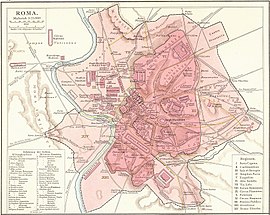The temple of Minerva Medica (akin to the temple of Apollo Medicus) was a temple in ancient Rome, built on the Esquiline Hill in the Republican era,[1] though no remains of it have been found. Since the 17th century, it has been wrongly identified with the ruins of a nymphaeum on a nearby site, on account of the erroneous impression that the Athena Giustiniani had been found in its ruins.[2]
 Click on the map for a fullscreen view | |
| Coordinates | 41°53′31″N 12°30′08″E / 41.8920°N 12.5022°E |
|---|---|
Location
editIts position in the regionary catalogue, between the campus Viminalis and the temple of Isis Patricia, points to a site in the northern part of Region V.[3] But hundreds of votive offerings, including one in which the temple is attested,[4] were discovered in the Via Curva (the modern Via Carlo Botta), just west of the Via Merulana, and this may be the better location.[5] Some tuff walls, resembling ritual trenches known as favissae were also found there.
See also
editReferences
edit- ^ Cicero, De divinatione II.123: sine medico medicinam dabit Minerva, and CIL VI.10133, 30980.
- ^ HJ 360; LS III.158‑161.
- ^ Samuel Ball Platner (1904). The Topography and Monuments of Ancient Rome. Allyn and Bacon. pp. 440–.
- ^ 30980.
- ^ Bullettino della Commissione Archeologica Comunale di Roma 1887:154‑156, 192‑200; 1888: 124‑125; Mitteilungen des Deutschen Archaeologischen Instituts, Romische Abteilung. Bullettino dell'Istituto archeologico germanico, Sezione romana 1889: 278; Jordan 353; Rosch. II.2989; Cons. 305‑312
External links
edit- Temple
- Lucentini, M. (31 December 2012). The Rome Guide: Step by Step through History's Greatest City. Interlink. ISBN 9781623710088.
Media related to Temple of Minerva Medica (Rome) at Wikimedia Commons
| Preceded by Temple of Janus |
Landmarks of Rome Temple of Minerva Medica |
Succeeded by Temple of Portunus |

